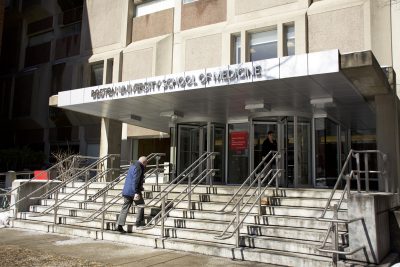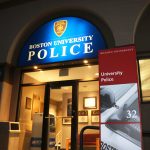
Deliberation over the planned Biosafety Level 4 research at Boston University Medical Campus’ National Emerging Infectious Diseases Laboratories continued at the Boston Biosafety Committee’s public meeting last Monday.
BU faculty and administration affirmed the research’s safety to the BBC, an advisory group to the Boston Public Health Commission. The BPHC’s approval is the next and final hurdle the biolab must clear, BU spokesperson Colin Riley said. The Centers for Disease Control and Prevention has already approved the research.
Riley attended the meeting and presented in favor of the research facility. After the meeting, he said he was pleased with how the biolab’s approval process is moving despite the opposition.
“The comment period is over, so now it’s just up to [the BBC] to advise the BPHC,” he said.
Boston City Councilor Tito Jackson, an active opponent of the biolab, attended the meeting. The Daily Free Press reported on Jackson’s recent initiative to legally block the biolab through preventative legislation.
Jackson’s proposed ordinance would ban Biosafety Level 4 research from Boston, his director of communications, Heshan Berents-Weeramuni, said.
Berents-Weeramuni said Jackson’s oppositional stance is due to the dense population where the biolab is situated.
“Boston University wants to up from Level 3 to Level 4 pathogen research right there, basically in the heart of the South End and Roxbury,” Berents-Weeramuni said. “We’re talking about Ebola [and] smallpox.”
Though Jackson was alone in his opposition at the meeting, Berents-Weeramuni said Jackson has the backing of the Massachusetts Nurses Association and the Lawyers Committee for Civil Rights Under Law.
“This is not like an anti-science stance,” Berents-Weeramuni said. “What [Jackson] is concerned about is that the biolab itself is in a particular area of Boston that has a number of other types of institutions … a residential area, a highway, a jail, three methadone clinics, two transit stations.”
Jackson plans to push his legislation past BBC and straight to a hearing with City Council, Berents-Weeramuni said. The hearing is expected to take place within the next six weeks and will be followed by a vote.
Berents-Weeramuni said the only other biolab that tests Biosafety Level 4 matter in a densely populated urban area is in Atlanta, Georgia, and Jackson is skeptical of that lab’s safety as well.
“They have had numerous problems themselves in maintaining their own standards,” Berents-Weeramuni said. “They’ve had their own labs shut down for violations of their own protocol.”
BPHC Director of Communications Marjorie Nesin addressed safety concerns and reiterated BPHC’s commitment to cooperating with local and federal agencies to ensure the lab’s continued safety.
“If Biosafety Level 4 Research is ultimately approved, BPHC will continue to work in coordination with Boston EMS, Boston Fire Department, Boston Police Department and other agencies at the local, state and federal levels to ensure that any research done at the NEIDL complies with all applicable regulations, in order to protect the health and safety of workers and residents,” Nesin wrote in an email to The Daily Free Press.
Nesin explained the center’s intensive vetting of NEIDL.
“[BPHC] has continued to carry out a rigorous review process of [NEIDL],” Nesin wrote. “The application remains under review as all parties continue the rigorous review process.”
Riley said although Jackson’s legislation is now in City Council’s hands, BU is ready to testify in favor of the biolab’s Biosafety Level 4 research.
“[A similar ordinance] has been proposed before, and [it was] not approved by the City Council,” Riley said. “We’re happy to testify in a hearing, and look forward to it because it was defeated last time.”
Several BU students said as long as the biolab’s strict safety regulations are upheld, its function should be carried out.
Lina Salameh, a sophomore in the College of Communication, said she trusted strict safety regulations would protect the local community from any potential health hazards.
“I trust the fact that people have already set regulations in place, and hopefully put them at very, very high standards,” Salameh said. “I think it’s more so keeping up with regulations and maintaining the high level of them, that is going to be the most important factor.”
Ekedi Fausther-Keeys, a freshman in the Sargent College of Health and Rehabilitation Sciences, said she believed NEIDL’s safety would be under extra scrutiny because of the biolab’s proximity to students.
“There are tests and labs in many city areas, so what’s the difference here if the lab is safe?” Fausther-Keeys said. “If you’re testing in an area where there’s a school, obviously you have some high standards because you are not trying to risk the lives of students.”
Hector Meneses, a sophomore in the Questrom School of Business, said he was enthusiastic about BU taking initiative in fighting diseases.
“We have to start taking these risks,” Meneses said. “I think that it’s great that BU is taking an interest in combating infectious diseases because to be honest, if they were able to find an actual cure, or able to prevent these diseases from spreading, what better place to do this then in Boston, where all the other pharmaceutical corporations are at.”




